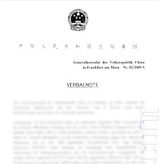A South Korean court issued an order on May 4 canceling four Shen Yun performances in Seoul, repealing an earlier court decision defending the company’s right to perform. The ruling clearly states that the cancellation is due to threats, especially financial ones, from the Embassy of the People’s Republic of China.
Shen Yun initially had a contract with Seoul’s KBS Hall, and was scheduled to perform four shows May 6-8. But on Jan. 22, KBS Hall canceled the venue rental after receiving a letter from the Chinese Embassy in South Korea. The letter included the usual slander and lies about Shen Yun that the Chinese Communist Party has been spreading since Shen Yun was founded 10 years ago. It also contained threats of cutting off potential business with China.
Shen Yun’s hosting organization in Korea, New Cosmos Media, then took the case to court. On April 19, Seoul Southern District Court issued an order ruling that the cancellation does not hold, and that Shen Yun must be allowed to perform at KBS. But on April 29, the embassy issued another official document and sent it to KBS Hall, again with the same libel and threats. Thus, on May 4, the court revoked its decision and canceled Shen Yun’s four performances—even though thousands of tickets had already been sold.
The court order also revealed the implicit financial threat
involved. It noted that KBS, or Korean Broadcasting System, the national public
broadcaster that owns the hall, currently broadcasts content in China. If Shen
Yun’s shows were canceled, the court order reasoned, the theater would only
have to compensate the company’s loses. But if Shen Yun performed and, as a
result, the Chinese Communist Party retaliated and revoked KBS’s content
dissemination rights in China, then KBS stood to lose upwards of eight million
dollars.
Troubling
Pattern in South Korea
This is not the first time that representatives of the Chinese Communist Party have infringed upon Shen Yun performances. Not satisfied with barring Shen Yun from performing in China, they have repeatedly tried to sabotage Shen Yun ever since the company’s inception. The tactics employed have often changed, and mostly fail—sometimes they even lead to more publicity and increased ticket sales.
Over the years, these tactics have included:
- Dispatching performance companies to compete with Shen Yun around the world, in an effort to make it impossible for Shen Yun to survive financially. Often, the competing shows were set up across the street from Shen Yun’s theater during the same exact dates. This tactic was mostly abandoned after the first few years.

- Tampering with Shen Yun’s tour vehicles. In one case, a cut was made in the front tire of a bus so that it would not instantly deflate but would explode under high pressure on the freeway; fortunately, this was discovered during inspection. Several such incidents have been recorded, but have also mostly stopped in recent years due to increased security around Shen Yun vehicles.

- The Chinese Communist Party, through its embassies and consulates, has often tried pressuring theaters to cancel scheduled Shen Yun performances. Its representatives have called, written letters, and visited theaters in North America, Asia, and Europe, urging them not to sign contracts with Shen Yun or to nullify existing agreements. They often threaten that, if the theaters do not comply, the country’s political and economic relations with China will suffer.
For a list of the various tactics and how they have evolved over
time, see: Challenges We Face.
For a
table documenting 59 incidents of interference and sabotage attempts, see: Who’s Afraid of Shen Yun?
This last tactic was the one employed with KBS Hall. In most free countries, this tactic fails. Theater managers and local officials are often irked that a foreign government is trying to dictate what shows they should run.
Unfortunately, this year, Seoul’s KBS Hall complied with the
Chinese Embassy, and the South Korean district court, too, went against its own
better judgment in the initial court order, and bowed down to the pressure.
History
of Sabotage in Korea
While the vast majority of theaters around the world have withstood this form of interference, South Korean theaters have, over the years, shown to be more susceptible.
Before this week’s case, five major incidents had already been documented:
April 2007: The Keox Auditorium Hall was scheduled to hold a Shen Yun show, hosted by New Tang Dynasty Television. On March 16, NTD was notified of the show’s cancellation. The case was brought to court under the allegation that the show was canceled due to Chinese Embassy pressure. NTD won the case, but the theater refused to open its doors, and the performance had to be canceled.
Feb. 2008: Shen Yun shows scheduled at the KBS Busan Hall (owned by state-run KBS TV) were canceled due to fear of diplomatic frictions with the Chinese regime. The case was brought to court, with the decision upholding the legitimacy of the show’s cancellation.
Feb. 2008: Shen Yun performances, scheduled to be play at Kyung Hee University’s Grand Peace Palace, were canceled. The reason given was an overlapping schedule with other university activities. But pressure from the Chinese Embassy in Seoul was evident and the case was brought to court. The hosting organization won the case and the show took place as initially planned.
Feb. 2009: Shen Yun was scheduled to perform at Universal Art Center (run by a religious foundation). But the Chinese Embassy in Seoul threatened the theater that if the show were not canceled, members of the Korean foundation who conduct business in China will not be given visas. The embassy also threatened that the foundation will risk economic loss of hundreds of millions of dollars that they invested in China if they allow the Shen Yun performance to take place. The show was initially canceled, but the case was brought to court, the cancellation was overturned, and the show successfully performed.
Jan. 2011: Shen Yun was scheduled to perform
Jan. 19 at the Busan City Cultural Center, hosted by the South Korean Falun
Dafa Association. The Association signed a rental contract with the Cultural
Center on Nov. 12, 2010. But on Dec. 21, the theater sent the hosting
organization a notice saying it was canceling the performance, in effect
reneging on the contract. On Jan. 16, three days before the performance, the
hosting organization held a press conference in front of the Busan Chinese
Consulate, and on Jan. 18, 2011, the hosting organization submitted a petition
to the Busan District Court’s Second Administrative Department. The following
morning, as the court reviewed the case, Shen Yun’s artists and technical crew
arrived at the Busan theater to set up that night’s performance, but were not
allowed inside. Around noon, the District Court’s ruling reached the theater,
with the verdict that Shen Yun must be allowed to perform. After a breakneck
setup completed in less than half the usual time, Shen Yun performed to a full
house.
Explicit Evidence
In the past, when the Chinese consulates and embassies tried sabotaging Shen Yun performances, it never admitted coercing the theaters, elected officials, or the legal systems of other countries. But by issuing two official documents to Seoul’s KBS Hall, the Chinese Embassy has this time provided direct evidence of its intentions.
The court orders document these manipulation tactics beyond China’s borders. They also show the regime’s use of political power and financial benefit to try and censor the performing arts world.


